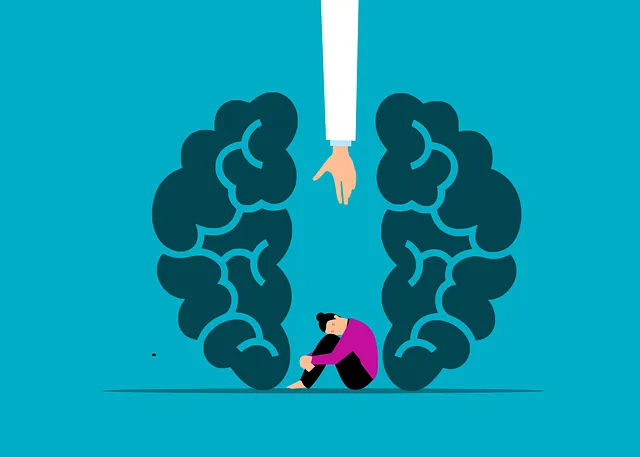Lone Tree Kaiser Permanente mental health services prioritize risk management through multifaceted strategies. They identify and address staff burnout, trauma exposure, and high patient caseloads with stress management training, mindfulness meditation, and self-care routines. The Mental Wellness Podcast Series offers valuable resources, while community outreach programs strengthen ties. Regular risk assessments, crisis response plans, and continuous learning ensure a supportive environment, enhancing both practitioner well-being and patient outcomes in Lone Tree Kaiser Permanente's mental health division.
At Lone Tree Kaiser Permanente, mental health professionals face unique risks that demand meticulous planning. This article delves into a comprehensive risk management strategy tailored for this environment, focusing on Lone Tree Kaiser Permanente mental health practices. We explore understanding and mitigating risks, from identifying potential hazards to implementing effective safeguards and crisis response plans. Additionally, we emphasize ongoing training, monitoring, and improvement as essential components of a robust risk management framework for Lone Tree Kaiser Permanente’s mental health professionals.
- Understanding Risks in Mental Health Practice at Lone Tree Kaiser Permanente
- Developing a Comprehensive Risk Management Strategy
- Identifying and Assessing Potential Hazards
- Implementing Safeguards and Crisis Response Plans
- Ongoing Training, Monitoring, and Improvement for Mental Health Professionals
Understanding Risks in Mental Health Practice at Lone Tree Kaiser Permanente

At Lone Tree Kaiser Permanente, understanding risks in mental health practice is paramount to ensuring patient safety and well-being. The environment within mental health facilities can be highly charged, with professionals often dealing with complex and sensitive cases. This necessitates a proactive approach to risk management planning. By identifying potential hazards, such as burnout due to high caseloads or exposure to traumatic narratives, healthcare providers can implement targeted strategies to mitigate these risks.
One effective method employed by Lone Tree Kaiser Permanente is integrating practices like stress management and mindfulness meditation into the daily routine. These techniques not only support the mental wellness of professionals but also enhance their ability to provide compassionate care. Additionally, the organization produces a Mental Wellness Podcast Series, offering valuable insights and resources for both staff and patients, further contributing to a comprehensive risk management strategy.
Developing a Comprehensive Risk Management Strategy

Developing a Comprehensive Risk Management Strategy at Lone Tree Kaiser Permanente’s mental health division involves a multi-faceted approach tailored to address unique challenges faced by professionals in this field. The strategy should encompass a robust Self-Care Routine Development for Better Mental Health, ensuring therapists and counselors prioritize their emotional well-being through structured practices. By integrating Emotional Well-being Promotion Techniques, such as mindfulness exercises and stress management training, the organization can foster a resilient work environment.
Furthermore, implementing a Community Outreach Program can enhance the mental health services offered. This initiative allows professionals to engage with the local community, providing resources and support that extend beyond traditional therapy settings. Such outreach programs not only strengthen community ties but also offer alternative avenues for risk mitigation, promoting holistic mental health care at Lone Tree Kaiser Permanente.
Identifying and Assessing Potential Hazards

At Lone Tree Kaiser Permanente, mental health professionals are acutely aware that their well-being is integral to delivering quality care. Identifying and assessing potential hazards is a foundational step in risk management planning. This process involves scrutinizing various facets of the work environment, including high patient caseloads, complex cases with intense emotional demands, and the inherent stress associated with managing mental health conditions. By meticulously evaluating these factors, professionals can anticipate and mitigate risks that may impact their mental resilience and, consequently, patient outcomes.
The assessment should also consider broader systemic issues, such as institutional culture and support mechanisms. Encouraging open dialogue about mental health challenges, fostering a supportive environment, and implementing strategies for Anxiety Relief are key components of this process. Additionally, Mental Illness Stigma Reduction Efforts play a pivotal role in creating a safe space for both patients and practitioners. Nurturing an atmosphere where inner strength is celebrated and encouraged empowers professionals to better manage stress and develop robust coping mechanisms, ensuring they can provide the best care possible.
Implementing Safeguards and Crisis Response Plans

Implementing robust safeguards and crisis response plans is paramount for Lone Tree Kaiser Permanente mental health professionals to ensure patient safety and effective care. These measures include establishing clear protocols for managing acute crises, such as suicidal ideation or severe emotional distress. Regularly scheduled risk assessments and ongoing monitoring of patient progress allow practitioners to proactively identify emerging risks and implement timely interventions.
By integrating strategies like self-care routine development for better mental health and mood management techniques into their practices, healthcare professionals at Lone Tree Kaiser Permanente can mitigate potential hazards while fostering a supportive environment. These proactive steps not only enhance the well-being of mental health practitioners but also contribute to improved patient outcomes, reflecting a comprehensive approach to care at Lone Tree Kaiser Permanente.
Ongoing Training, Monitoring, and Improvement for Mental Health Professionals

Mental health professionals at Lone Tree Kaiser Permanente are committed to continuous learning and improvement, recognizing that staying current with best practices is essential for delivering quality care. Ongoing training sessions focused on evidence-based therapies, cultural competency, and ethical considerations ensure practitioners stay informed about advancements in their field. These regular meetings foster a collaborative environment where professionals can share insights, discuss complex cases, and learn from one another.
Monitoring progress and implementing improvement strategies are integral to the organization’s Mental Health Policy Analysis and Advocacy efforts. Self-awareness exercises and self-care practices are encouraged to prevent burnout and maintain clinicians’ well-being. Regular performance evaluations, coupled with peer feedback, allow for continuous growth and development, ensuring that Lone Tree Kaiser Permanente mental health services remain at the forefront of modern healthcare.
For mental health professionals at Lone Tree Kaiser Permanente, robust risk management planning is not just a best practice—it’s an imperative. By understanding risks specific to mental health practice, developing comprehensive strategies, and continually assessing and mitigating potential hazards, professionals can ensure the safety and well-being of both patients and themselves. Ongoing training, monitoring, and improvement are key to maintaining high standards of care at Lone Tree Kaiser Permanente mental health services.






